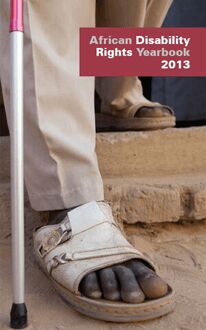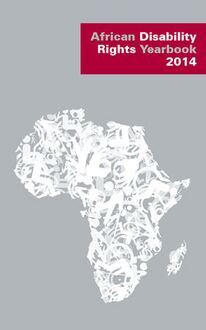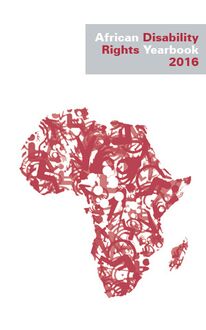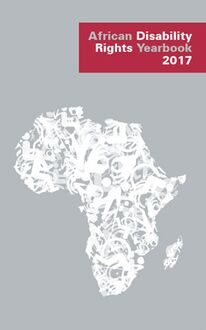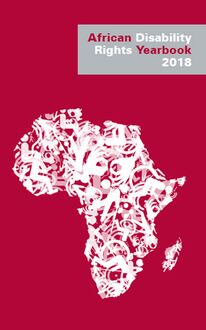-
 Univers
Univers
-
 Ebooks
Ebooks
-
 Livres audio
Livres audio
-
 Presse
Presse
-
 Podcasts
Podcasts
-
 BD
BD
-
 Documents
Documents
-
- Cours
- Révisions
- Ressources pédagogiques
- Sciences de l’éducation
- Manuels scolaires
- Langues
- Travaux de classe
- Annales de BEP
- Etudes supérieures
- Maternelle et primaire
- Fiches de lecture
- Orientation scolaire
- Méthodologie
- Corrigés de devoir
- Annales d’examens et concours
- Annales du bac
- Annales du brevet
- Rapports de stage
La lecture à portée de main
335 pages
English
African Disability Rights Yearbook Volume 2 2014 , livre ebook
335 pages
English
YouScribe est heureux de vous offrir cette publication

Description
The 2014 issue of the African Disability Rights Yearbook addresses disability rights within the foundational structure laid down by the inaugural issue. The structure comprises a tripartite division between: articles; country reports; and shorter commentaries on recent regional and sub-regional developments.The African Disability Rights Yearbook aims to advance disability scholarship. Coming in the wake of the United Nations Convention on the Rights of Persons with Disabilities, it is the first peer-reviewed journal to focus exclusively on disability as human rights on the African continent. It provides an annual forum for scholarly analysis on issues pertaining to the human rights of persons with disabilities.It is also a source for country-based reports as well as commentaries on recent developments in the field of disability rights in the African region.The African Disability Rights Yearbook publishes peer-reviewed contributions dealing with the rights of persons with disabilities and related topics, with specific relevance to Africa, Africans and scholars of Africa.The Yearbook appears annually under the aegis of the Centre for Human Rights, Faculty of Law, University of Pretoria.The Yearbook is an open access online publication, see www.adry.up.ac.zaAbout the editors:Charles Ngwena is Professor, Department of Constitutional Law and Legal Philosophy, Faculty of Law, University of the Free State, South Africa.Ilze Grobbelaar-du Plessis is a senior lecturer and holds the degrees BIuris LLB LLM LLD from the University of Pretoria.Helene Combrinck is Associate Professor at the Centre for Disability Law and Policy, University of the Western Cape.Serges Djoyou Kamgais is Senior Lecturer at TMALI (UNISA).
Sujets
Informations
| Publié par | PULP (Pretoria University Law Press) |
| Date de parution | 01 janvier 2014 |
| Nombre de lectures | 0 |
| Langue | English |
| Poids de l'ouvrage | 2 Mo |
Extrait
African Disability Rights Yearbook
Volume 2 2014
2014
African Disability Rights Yearbook
Published by: Pretoria University Law Press (PULP) The Pretoria University Law Press (PULP) is a publisher at the Faculty of Law, University of Pretoria, South Africa. PULP endeavours to publish and make available innovative, high-quality scholarly texts on law in Africa. PULP also publishes a series of collections of legal documents related to public law in Africa, as well as text books from African countries other than South Africa. This book was peer reviewed prior to publication.
For more information on PULP, see www.pulp.up.ac.za
Printed and bound by: BusinessPrint, Pretoria
To order, contact: PULP Faculty of Law University of Pretoria South Africa 0002 Tel: +27 12 420 4948 Fax: +27 12 362 5125 pulp@up.ac.za www.pulp.up.ac.za
Cover: Yolanda Booyzen, Centre for Human Rights
ISSN: 2311-8970
© 2014
1
2
3
4
5
6
TABLE OF CONTENTS
EDITORIAL
SECTION A: ARTICLES
v
The right to inclusive education in Botswana: Present challenges and future prospects 3 Obonye Jonas
The Basic Education Act of 2013: Why it is one step forward and two steps back for children with disabilities in Kenya 33 William Aseka Arlene S Kanter
Too little, too late? The CRPD as a standard to evaluate South African legislation and policies for early childhood development 51 Sue Philpott
Everybody counts: The right to vote of persons with psychosocial disabilities in South Africa Heléne Combrinck
75
Termination of pregnancy of persons with mental disabilities on medical advice: A case study of South Africa 101 Ashwanee Budoo Rajendra Parsad Gunputh
Economic discourses of disability in Africa: An overview of lay and legislative narratives 121 Shimelis Tsegaye Tesemma
SECTION B: COUNTRY REPORTS
Botswana Thuto Hlalele Romola Adeola Adebayo Okeowo Daba Bacha Muleta Lucius Batty Njiti
Egypt Lila Meadows Nadia Adib Bamieh Janet E Lord
Kenya Elizabeth Kamundia
Malawi Enoch MacDonnell Chilemba
iii
151
169
185
207
Mauritius Ashwanee Budoo Roopanand Amar Mahadew
Uganda Louis O Oyaro
Zambia Natasha Banda Likando Kalaluka
Zimbabwe Esau Mandipa Gift Manyatera
SECTION C: REGIONAL DEVELOPMENTS
227
247
267
287
Developments regarding disability rights during 2013: The African Charter and African Commission on Human and Peoples’ Rights 309 Heléne Combrinck Lawrence M Mute
Baby steps: Developments at the African Committee of Experts on the Rights and Welfare of the Child (2013-2014) 319 Lorenzo Wakefield
Disability rights in the sub-regional economic communities during 2013 Lucyline Nkatha Murungi
iv
323
EDITORIAL
The editors of theAfrican Disability Rights Yearbook(ADRY) are pleased to announce the publication of the second volume of theADRY amidst what promises to be steadily growing visibility of disability rights in the African region. During the course of 2014, Angola, Burundi, the Republic of Congo, Côte d'Ivoire, and Guinea Bissau became the latest members of the African Union to ratify the Convention of the Rights of Persons with Disabilities (CRPD). The CRPD now enjoys at least a 70 per cent level of ratification among African States. Clearly, the winds of disability rights are blowing across the continent.
The 2014 issue of theADRYaddresses disability rights within the foundational structure laid down by the inaugural issue. The structure comprises a tripartite division between: articles; country reports; and shorter commentaries on recent regional and sub-regional developments. To this end, Section A of the 2014 volume features six chapters that speak to the intersection between disability rights and a range of crucial socio-economic sectors that, even when they focus on specific countries, nonetheless, are emblematic of unmet rights across the African region as a whole. The first two chapters focus on the imperatives of the duty of the State to provide inclusive education for learners with disabilities. In the first chapter, Obonye Jonas begins by discussing the principles underpinning the human right to inclusive education so as to elicit its normative essence, not least because inclusive education can be understood in divergent ways. Ultimately, the author puts Botswana’s laws, policies and programmes under the spotlight. Jonas concludes that Botswana’s school system has a long way to go before it can adequately respect, protect and fulfil the human right to inclusive education in the manner contemplated by article 24 of the CRPD. This is because Botswana exhibits several gaps, including the absence of enabling legal measurers to protect the right to inclusive education, and inconsistencies between policies purporting to subscribe to inclusive education and a school system which in practice remains inaccessible to learners with disabilities in a variety of ways.
William Aseka and Arlene Kanter follow with a joint chapter which also hones in on inclusive education but in the context Kenya. The authors critically appraise the Basic Education Act of Kenya of 2013 using article 24 of the CRPD as their main normative yardstick. The Basic Education Act is a measure that came at the back of the Constitution of Kenya of 2010. The Constitution contains provisions that guarantee persons with disabilities a right to have access to educational institutions and facilities that are integrated into society (article 54(b)). It also guarantees every child a right to free and compulsory basic education (article 53(b)). The authors argue that, on the one hand, the Basic Education Act is a progressive development. The Act establishes, for the first time in Kenya’s history, a legal right to education forallchildren. On the other hand, the Basic Education Act has significant shortcomings. In the authors’ view, in a number of areas it falls short of meeting standards of inclusive education which are laid down by article 24 of the CRPD. Aseka and Kanter submit that, in the main, the Act’s shortcomings lie in perpetuating a discriminatory ‘separate but equal’ school system through retaining ‘special schools’, and failing to establish a system which ensures the provision of reasonable accommodations.
In the third chapter, Sue Philpott examines the intersection between early childhood development, the implicit normative standards that are laid down by the CRPD in this area, and South African legislative, policy and other measurers for supporting early childhood development. The author’s point of departure is that provision of early childhood development has important implications for the development of all children and more so for children with disabilities. Early childhood development provides opportunities for early interventions as well as lays the foundation for social inclusion and participation. Drawing from normative standards laid down by the CRPD, Philpott evaluates how South Africa is faring in the provision of early childhood development by examining the responsiveness of legislative and policy measurers in the specific areas of social services and social protection, health and nutrition, and education. The author argues that when measured against the CRPD, South Africa’s efforts fall short in many spheres. The
v
country’s efforts are ‘too little’ in respect of social services, social protection and health, and ‘too late’ in respect of early learning and inclusive education. In the area of inclusive education, Philpott’s arguments and observations incidentally reinforce those of Jonas, Aseka and Kanter in terms of underscoring shared shortcomings among African jurisdictions.
One of the areas in which disability-related discrimination remains not only historically embedded but also largely inscribed in many laws across the world is the exclusion from the right to vote of persons legally deemed to lack the requisite mental decision-making capacity. This area comes under scrutiny in the fourth chapter by Heléne Combrinck. Against the backdrop of the paradigm-changing standards ushered in by the CRPD, Combrinck’s chapter is partly an exploration and appraisal of the historical misrecognition of persons with psychosocial disabilities in respect of the right to vote. The chapter is also an explication of the normative standards that are prescribed by the CRPD in order to protect the right to participate equally in voting by people with psychosocial disabilities. The author examines the implications of the CRPD’s standards in terms of requiring transformative legal and other reforms at the domestic level in order to recognise the legal capacity of an erstwhile excluded social group. Whilst the author’s jurisdictional focus is, ultimately, South Africa, nonetheless, the discussion has much wider application. This is an area where most jurisdictions in different parts of the world still sit with laws that unjustifiably continue to disenfranchise persons with psychosocial disabilities among other social groups whose mental health has historically been officially stigmatised to the point of being made the object of naked discrimination. Combrinck underscores that the CRPD normatively requires the recognition of legal capacity ofall persons with psychosocial disabilities. Therefore, in order to comply with the CRPD and overcome the status subordination of persons with psychosocial disabilities, it is not up to States to cherry-picksomepersons with psychosocial disabilities for legal recognition when instituting reforms as this would be tantamount to incomplete and, indeed, discriminatory reform.
The fifth chapter by Ashwanee Budoo and Rajendra Gunputh continues with the theme of exploring the implications of the CRPD standards for African domestic legal regimes which sanctify the status subordination of persons that are deemed to lack requisite decision-making capacity but focusing on reproductive self-determination. Equally significant, the chapter extends the exploration to include the implications of provisions of the domestic constitution that are applicable to reproductive health decision-making. Budoo and Gunputh appraise section 5(4)(a) of the South African Choice on Termination of Pregnancy Act of 1996 against the standards prescribed by the CRPD as well as fundamental rights guaranteed by the South African Constitution of 1996. Section 5(4)(a) of the South African Act permits the decision to terminate the pregnancy of a woman who is ‘severely mentally disabled’ to be made by a proxy in the form of a natural guardian, spouse, legal guardian or curator personae. The authors argue that, at a philosophical level, one of the shortcomings with section 5(4)(a) is that it implicitly adopts a ‘medical model’ of disability in its conceptualization and regulation of ‘mental disability’ in contradistinction to a ‘social model’. Consequently, through an implicit discourse of disability as lack, it fails to recognise the human dignity and equality of women with mental disabilities. Budoo and Gunputh conclude that section 5(4)(a) of the Choice on Termination of Pregnancy Act fails both human rights and constitutional muster. It patently violates provisions of the CRPD, not least the rights to: equal recognition before the law (article 12); reproductive choice (article 23); and free and informed consent (article 25). In equal measure, the authors conclude that section 5(4)(a) also violates several provisions of the South African Constitution, not least provisions that guarantee the rights to: equality (section 9); human dignity (section 10); and reproductive choice (section 12(2)(a)). The authors call for remedial legislative reform.
The last chapter by Shimelis Tsegaye Tesemma breaks from the focus on a specific jurisdiction as the preceding chapters do. The author develops a narrative that considers the laws of several African countries within a context of unmasking the moral assumptions that underpin the intersection between disability and economic perspectives or models of disability, and their intended as well as unintended consequences on the dignity and equality of persons with disabilities.
vi
Foremost, the author seeks to highlight that laws which are ostensibly intended to provide support to persons with disabilities can concomitantly undermine any such support if persons with disabilities are substantively treated as a burden on a specific sector or on society as a whole. The thrust of Tesemma’s argument is that economic discourses that portray disabled people as economically dependent, as is implicit in many social security or social welfare laws of African States and beyond, for example, are instances of a contradictory discourse which perpetuates the charity model of disability at the same time as purporting to meet individual need. The author argues that this ambivalent discourse should be replaced by laws that embrace a discourse of ‘independent living’ so that when a disabled person comes into contact with the social welfare system, he/she is treated as a rights-holder and not as someone seeking alms.
In Section B of theADRY, a new set of countries are reported on – eight in all – thus adding to the stock of countries that were reported on in the 2013 volume. The country reports in this volume are on:Botswana by Thuto Hlalele, Romola Adeola, Adebayo Akeowo, Daba Bacha Muleta and Lucius Batty Njiti; Egyptby Lila Meadows, Nadia Adib Mamieh and Janet Lord;Kenyaby Elizabeth Kamundia;Malawiby Enoch MacDonnell Chilemba;MauritiusAshwanee by Budoo and Roopanand Amar Mahadew;Ugandaby Louis Oyaro;Zambiaby Natasha Banda and Likando Kalaluka; andZimbabweby Esau Mandipa and Gift Manyatera.
Section C reports and comments on African regional and sub-regional developments. Heléne Combrinck and Lawrence Mute report on developments relating to the work of the African Commission on Human and Peoples’ Rights; Lorenzo Wakefield on developments relating to the African Committee of Experts on the Rights and Welfare of the Child; and Lucyline Nkatha Murungi on the East Africa Community.
We sincerely hope that readers will find the 2014 volume of theAYDR– our very second issue – a useful resource and an addition to archives on disability rights in the African region. The volume seeks to build upon the inaugural issue of 2013 in terms of reinforcing the main objective of providing a forum for developing a critical disability rights discourse in the African region as well as reporting on recent developments in the disability rights field. In similar vein, it is our hope that this volume contributes towards theADRY becoming a critical bibliographical source for African regional and country-specific discourses on disability as a human rights issue.
The financial assistance of the Open Society Initiative for Southern Africa (OSISA) is acknowledged with gratitude.
Editors Charles Ngwena(convening editor) Ilze Grobbelaar-du Plessis Heléne CombrinckSerges Djoyou Kamga
vii
SECTION A: ARTICLES
1 HAPTER C
Summary
THERIGHTTOINCLUSIVE EDUCATIONINBOTSWANA: PRESENTCHALLENGESAND FUTUREPROSPECTS
Obonye Jonas*
For many years children were prevented from enjoying their rights. They were 1 regarded as ‘… [mere] recipients of welfare rather than holders of specific rights’. This conception has left children vulnerable to exploitation without human rights safe-guards. While all children are vulnerable, those with disabilities are exposed to 2 increased vulnerability on account of negative traditional beliefs, societal stereotypes, stigma and ignorance. This article proceeds on the assumption that equipping children with disabilities with necessary education and skills through inclusive education will go a long way in ensuring both their personal and socio-economic development. It argues that the delivery of inclusive education to learners will be more effective if done through a human rights model. Through this model, the inherent equality of all people is recognised regardless of differences, abilities or disabilities. The article argues that despite the fact that inclusive education has gained immeasurable currency in modern pedagogy, Botswana has not done enough to cater for the education needs of children with disabilities and address the challenges that they face.
1
Introduction
The demand for social justice in the education sector, particularly in relation to children with disabilities has gained impetus in the world,
*
1
2
LLB (UB); LLM (Pretoria); Senior Lecturer, Law Department, University of Botswana and Practising Attorney with Jonas Attorneys. E-mail: jonas15098@yahoo.co.uk or obonye.jonas@mopipi.ub.bw. T KaimeThe African Charter on the Rights and Welfare of the Child: A socio-legal perspective (2009) 12. In many parts of Africa, including in Botswana, it is widely believed that disability is a result of witchcraft. See G Dart ‘Provision for learners with special educational needs in Botswana: A situational analysis’ (2007) (22)British Journal of Special Education56. For a contrary view, see B Ingstad ‘The myth of the hidden disabled: A study of community based rehabilitation in Botswana’ unpublished PhD thesis, University of Oslo, 1990, who argues that societies are beginning to embrace PWDs.
(2014) 2ADRY3-313
-
 Univers
Univers
-
 Ebooks
Ebooks
-
 Livres audio
Livres audio
-
 Presse
Presse
-
 Podcasts
Podcasts
-
 BD
BD
-
 Documents
Documents
-
Jeunesse
-
Littérature
-
Ressources professionnelles
-
Santé et bien-être
-
Savoirs
-
Education
-
Loisirs et hobbies
-
Art, musique et cinéma
-
Actualité et débat de société
-
Jeunesse
-
Littérature
-
Ressources professionnelles
-
Santé et bien-être
-
Savoirs
-
Education
-
Loisirs et hobbies
-
Art, musique et cinéma
-
Actualité et débat de société
-
Actualités
-
Lifestyle
-
Presse jeunesse
-
Presse professionnelle
-
Pratique
-
Presse sportive
-
Presse internationale
-
Culture & Médias
-
Action et Aventures
-
Science-fiction et Fantasy
-
Société
-
Jeunesse
-
Littérature
-
Ressources professionnelles
-
Santé et bien-être
-
Savoirs
-
Education
-
Loisirs et hobbies
-
Art, musique et cinéma
-
Actualité et débat de société
- Cours
- Révisions
- Ressources pédagogiques
- Sciences de l’éducation
- Manuels scolaires
- Langues
- Travaux de classe
- Annales de BEP
- Etudes supérieures
- Maternelle et primaire
- Fiches de lecture
- Orientation scolaire
- Méthodologie
- Corrigés de devoir
- Annales d’examens et concours
- Annales du bac
- Annales du brevet
- Rapports de stage
Signaler un problème
YouScribe
Le catalogue
Le service
© 2010-2024 YouScribe
